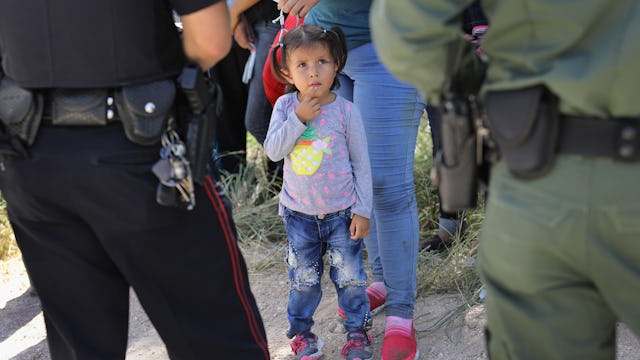President Of The AAP Calls Family Separation 'Child Abuse'

The President of the AAP visited a child detention center and the verdict is in: separating young children from their parents is literally child abuse
Dr. Colleen Kraft, the president of the American Academy of Pediatrics (AAP) has visited a a shelter on the Texas border for immigrant children who have been separated from their parents — and she is wants us to know that what’s happening is nothing less than child abuse.
“These children have been traumatized on their trip up to the border, and the first thing that happens is we take away the one constant in their life that helps them buffer all these horrible experiences,” she said on CNN this week. “That’s child abuse.”
Kraft, a medical doctor, was sure to explain that her accusation of child abuse is based on studies and scientific fact, not an emotional reaction.
“It disrupts their brain architecture and keeps them from developing language and social emotional bonds and gross motor skills and the development that they could possibly have,” she explained, adding that the separation causes “toxic stress.”
Kraft visited a small shelter equipped with 60 beds run by the Office of Refugee Resettlement earlier this week to observe conditions. But while the children had food, toys, and a clean environment, the well-known pediatrician saw the irreparable damage the children were undergoing simply by being away from their mothers and fathers during a time of upheaval in their lives.
“The really basic, foundational needs of having trust in adults as a young child was not being met. That contradicts everything we know that the kids need to build their health,” Kraft told The Washington Post.
At one point in the tour, she saw an inconsolable two-year-old girl screaming and banging her fists against the ground — and the workers at the shelter were not even allowed to touch her. She wasn’t having a regular toddler tantrum and she wasn’t in need of basic necessities.
“The really devastating thing was that we all knew what was going on with this child. We all knew what the problem was,” Kraft said. “She didn’t have her mother, and none of us can fix that.”
Extensive studies all agree that even short separations from parents can cause toxic stress, which in turn can lead to long-term problems that span from PTSD, anxiety, and depression to heart disease, stroke, and substance abuse issues. This type of stress can also affect learning and language development — and experts point out that many of these children are already battling trauma from the living conditions that caused them to flee their homeland as well as the journey to the border.
Kraft and the AAP are far from the only ones who are sounding the alarm that immigrant children are suffering long-term harm when they are separated from their parents, even for a handful of days. The American Medical Association (AMA) released a statement last week stating that a policy of separating children from their parents or other caregivers crossing the border “will do great harm” to children and could “create negative health impacts that will last an individual’s entire lifespan.”
In fact, 4,600 medical professionals and over 90 other medical organizations have signed a petition to stop this child abuse.
According to the Department of Homeland Security, over 2,000 minors were separated from their parents or guardians over six weeks in April and May. The public has responded by raising millions of dollars for non-profit immigration attorney organizations and organizing nationwide protests.